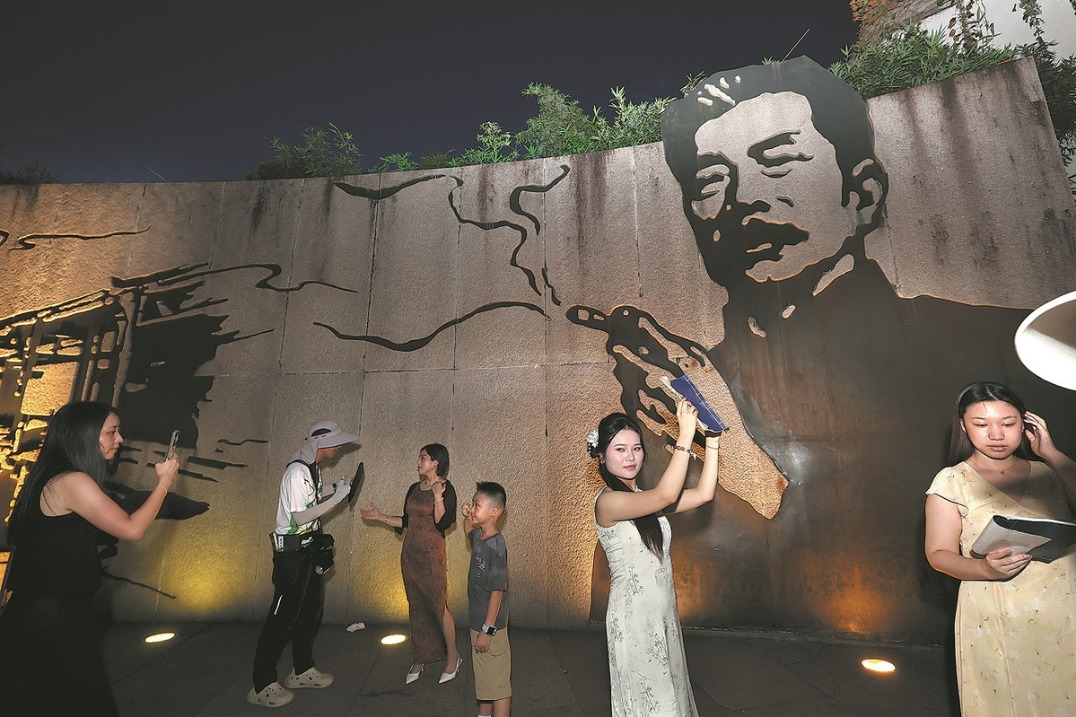Bringing beauty of Chinese poems to the world

CHICAGO-Sitting at the dining table in his home in the US Midwest state of Illinois, Cai Zongqi recalls his career teaching Chinese literature at the University of Illinois Urbana-Champaign.
"I am happy, finding a job I love and sharing Chinese culture with the world," he says with a smile on his face. "Academic research is a pursuit of my whole life."
Having lived in the United States for nearly 40 years, Cai has spent around 30 years sharing his understanding of Chinese literature with UIUC students.
In 2008, he edited and published the book How to Read Chinese Poetry, an anthology featuring 143 well-known poems composed over a period stretching from the early Zhou Dynasty (c. 11th century-256 BC) all the way to the Qing Dynasty (1644-1911).
Back then, Cai says he couldn't find good teaching material that could explain the beauty and cultural connotations of Chinese poems. With the help of the anthology, students can overcome language barriers and engage with Chinese poetical texts in ways that yield as much aesthetic pleasure and intellectual insight as one gets from the originals.
The book is so popular that it has been reprinted a number of times. Encouraged by this, Cai pressed ahead with more books, including How to Read Chinese Prose, How to Read Chinese Drama, and How to Read Chinese Literature, jointly with Peking University Professor Yuan Xingpei.
In Cai's eyes, Chinese poems embody the philosophy of the Chinese people, their ethics and attitude toward life, reflecting a rich humanistic tradition, pursuit of harmony and the golden mean, as well as their agony and detestation of war.
Cai holds that Chinese poems are an example of the resilience of Chinese culture. Reading Chinese poems may help readers, both Chinese and American, comprehend present life from a new perspective and live a better life.
To bring the beauty of Chinese poems and literature to more people around the world, Cai initiated the How to Read Chinese Poetry podcast this year, inviting a dozen renowned Sinologists as presenters. The program has been listed as a priority cultural exchange project by Lingnan University in Hong Kong.
The weekly podcast series kicked off at the start of the Chinese Lunar Year in February, with Professor William Nienhauser from the University of Wisconsin at Madison guest-hosting three episodes on marriage and courtship poems.
Cai himself has so far hosted more than 10 episodes and plans to produce a total of 52 episodes, covering the major poetic genres from all Chinese dynasties. In the podcast, poems are read aloud in English and Mandarin, as well as in Cantonese, with classical Chinese music in the background.
In one episode, Professor Wai-yee Li of Harvard University discusses how a "barbarian" chief gained diplomatic advantages by reciting an ode included in Shijing, or The Book of Songs. In another, Professor Martin Kern of Princeton University discusses what Qu Yuan, a patriotic poet and minister of the ancient state of Chu during the Warring States Period (475-221 BC), meant to Han Dynasty (206 BC-AD 220) intellectuals.
"I have already received emails with questions and requests for further reading from listeners in both the US and in Europe," Lucas Rambo Bender, an assistant professor at Yale University, who also participated in the podcast series, says.
"I hope that more people will discover the podcast. I'll certainly be recommending it to my students and friends," he says.
"These poems and their traditions have changed my inner life experience in many lasting ways," says Philip Merrill, a 63-year-old retired writer. "To me, they are like new wine, fine Chinese wine."
"Men hate each other because they fear each other. They fear each other because they don't know each other. They don't know each other because they don't communicate with each other. They don't communicate with each other because they are separated from each other," Cai says, quoting Martin Luther King Jr.
To help people communicate, Cai says he will make the best use of his specialty in Chinese literature and poems "to share Chinese culture with the world".
Xinhua
Today's Top News
- Industrial upgrade pivots on digital tech
- Media center begins operations, welcomes journalists
- World leaders to attend V-Day events
- Commemorating victory against aggression upholds peace, justice: China Daily editorial
- Military drills against regional consensus: China Daily editorial
- China, India should jointly maintain peace in border areas, Defense Ministry says































